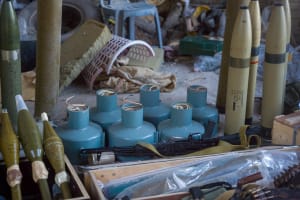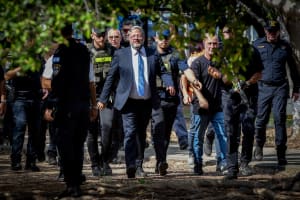Hezbollah’s conflict with Israel fuels rising sectarian tensions in Lebanon

The ongoing conflict between the Iranian-backed Lebanese terrorist group and Israel has exacerbated sectarian tensions within Lebanon. This escalation has led to significant internal displacement, further straining relations between Lebanon’s diverse religious communities, which include Sunni and Shia Muslims, various Christian sects and the Druze community. As the conflict intensifies, the internal divisions within Lebanon's fragile societal mosaic become more pronounced, creating further instability in the country.
Israel's military operations in southern Lebanon have mainly been focused on Hezbollah strongholds, located primarily in Shiia Muslim majority towns and villages. Marjayoun, a Chrisitan-majority southern Lebanese town has largely been spared from the ongoing battles between Hezbollah terrorists and Israel Defense Forces.
As large numbers of Lebanese civilians have evacuated Hezbollah-dominated areas, Marjayoun decided in September to provide accommodations for displaced people in its schools and a local church. As a result, many local Christians are concerned about the consequences of the year-long war, with some residents voicing concerns that Hezbollah will infiltrate their town and lead to IDF military operations in the area.
Philip Okla, the local priest of Marjayoun’s Orthodox Church, articulated the concerns shared by many of the residents.
“You can’t invite fire to your home,” Okla said in an interview with Reuters. “Now, barriers are going up and fears are rising because no one knows where we are going.”
After the Second Lebanon War in 2006, UN Resolution 1701 was passed, demanding that Hezbollah be disarmed and move all its forces from the Israeli border in the south up to the Litani River. Furthermore, the Lebanese Armed Forces was responsible for security in southern Lebanon. However, due to the weakness of the Lebanese state, the UN resolution was never enforced, allowing Hezbollah to become more powerful.
Israeli military operations against Hezbollah have also reached the Lebanese capital Beirut, where the Iranian-backed terrorist militia has a stronghold, which has also led to tensions between Muslim and Christian residents.
“There is tension. Everyone is scared today,” said Michel Khoury, the mayor of the Christian Beirut suburb Boutchay. Last Friday, local Christian residents prevented a truck from entering the neighborhood out of fear it was carrying Hezbollah weapons and would provoke an Israeli military response.
The Druze community is also concerned that the conflict between Hezbollah and Israel could undermine the entire Lebanese society. Lebanese Druze lawmaker Wael Abu Faour called for national unity, warning that the situation in Lebanon is dangerous.
“Beirut could explode because of the displaced, because of the friction, because of the disputes over properties – because [the residents of] the south, the Beqaa and the suburbs are all in Beirut,” Faour stated.
Even before Hezbollah began launching missiles into Israeli territory last October, Lebanon was facing a severe financial crisis due to years of widespread corruption and mismanagement.
In December 2021, UN Sec.-Gen. António Guterres urged the Lebanese leaders to prioritize the well-being of the nation and its citizens ahead of political infighting and rivalries.
“It is essential for leaders to put the people first, and implement the reforms needed to set Lebanon back on track, including efforts to promote accountability and transparency, and root out corruption,” Guterres said during a visit to Beirut.
The United Nations High Commissioner for Refugees Filippo Grandi described Lebanon as a “fragile country.”
“Any shock, and this is a major shock, can really make the country backtrack… and can cause big problems,” Grandi warned in an interview with Reuters.

The All Israel News Staff is a team of journalists in Israel.













